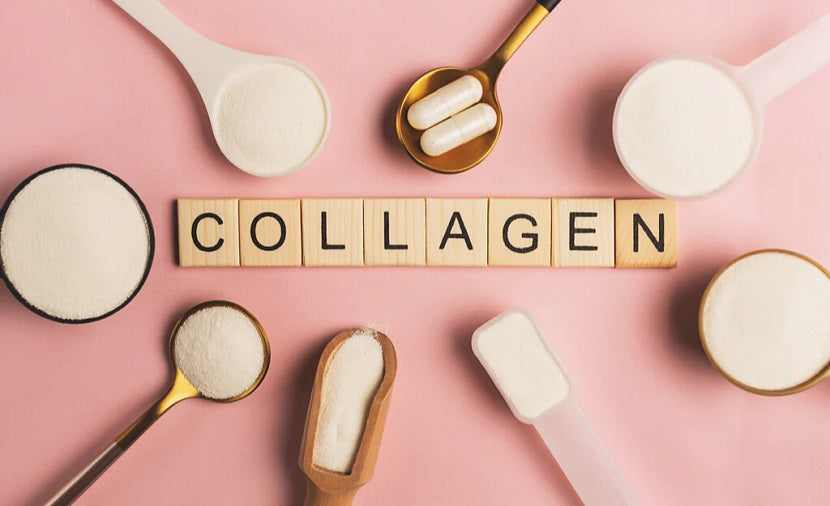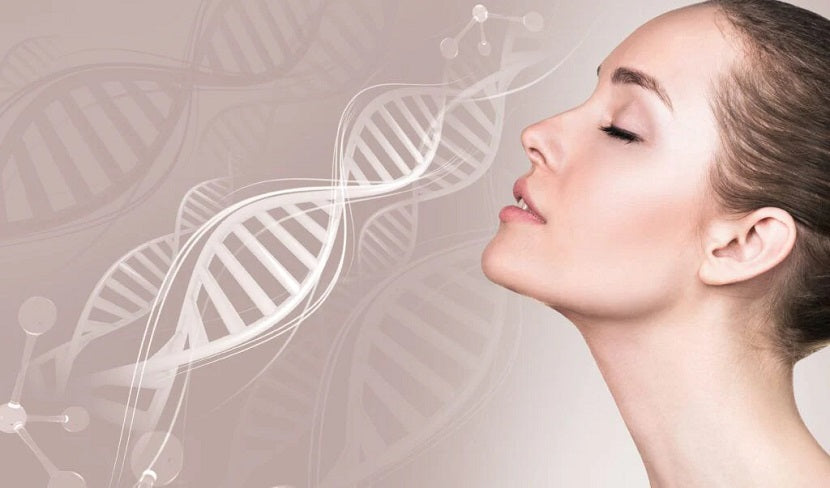Collagen peptides are definitely a buzz in the health world right now. For good reason too! Let me break it down for you. Collagen is a fibrillar protein that conjoins connective tissues. It’s the scaffolding system of the skin, bone and joints. Think of it as a support net, a building block, for all of your cellular structures, particularly your skin cells.
What Are Collagen Peptides?
Collagen is an abundant protein in animals and collagen peptides are broken down proteins made from amino acids. Collagen peptides are high in glycine, proline, hydroxyproline, and arginine amino acids. Collagen constitutes 95% of human skin! Gelatin, often used in food (jelly, gravies etc.) is a hydrolyzed form of collagen. The amino acids from collagen stay within the dermal matrix for up to 14 days enhancing skin structure, elasticity, nutrient absorption (including hyaluronic acid) and hydration.

How Are Collagen Peptides Beneficial For Skin Health?
Numerous studies have now concluded significant benefits of collagen peptides. From anti-wrinkle, anti-inflammatory, elastin enhancing and even reducing crow’s feet! If you’re wanting to plump up, collagen peptides are an ideal intervention. A 12-week study done taking oral collagen peptides showed:
- 35% reduction in overall wrinkle score
- 20% improvement in cheek elasticity
- 23% improvement in overall face elasticity
- 14% increase in hydration
- 22% increase in radiance
- 25% increase in firmness
- 20% reduction in eye wrinkles
- Protective mechanisms against skin autoimmune conditions
- Improves skin turnover rate
Other studies have shown benefits from supplementation after just 4 - 8 weeks. If you’re giving your skin the nutrients it needs to thrive in abundance… that’s just what it’ll do! Collagen peptides found in Happy Collagen can stimulate your own production of type I collagen and skin cell regeneration.
How Many Types Of Collagen Are There?
There are 26 different types of collagen peptides. Collagens type I and III compose the 90% of this skin layer in a distribution of 60%-80% type I and 15%-20% type III. Bovine collagen has been used medically for a temporary cover to nourish burns and wound healing. Overall types I, II and III are the most abundant in the body due to their excellent structural support.
Collagens type I and III compose the 90% of this skin layer in a distribution of 60%-80% type I and 15%-20% type III.

What Are The Most Commonly Used Collagen Peptides?
Collagen Type I
- This is highly associated with fibril formation.
- Often decreased in the skin with UV radiation
- Found predominantly in tendons, ligaments, bone, hair and the eyes cornea
- Is excellent for skin membrane health
- Ideal for wound healing and tissue regeneration
Collagen Type II
- Found predominantly in the lungs, cornea, connective tissues, hair, cartilage, and blood vessels
- Ideal for cardiovascular support
- Excellent for cartilage repair and arthritis
Collagen Type III
- Also found in the lungs, eyes, hair, connective, cartilage, vessel wall, bones, vitreous and skin
- Excellent for skin rejuvenation
- Ideal for reducing overall inflammation in the skin, bones, cartilage and cardiovascular system
- Wonderful for wound healing post-surgery or burns
Collagen Type IV
- Found in every tissue in the body
- Is essential for your bodies scaffolding systems
- Key skin structural support
- Regulates cellular communication and inflammation
Collagen Type XI
- Ideal for those suffering from osteoarthritis
- Excellent for eye health
- Supports optical disk, major eye vessels and the macula
Collagen peptides for hair and nail health
Collagen peptides are extensively renowned for hair, skin and nail support. The effectiveness of collagen peptides on hair, skin and nails have been established in many clinical trials.
If you’re finding these systems are weak, collagen is a great intervention! Collagen has been shown to:
- Reduce brittle nails
- Speed up nail growth rate
- Reduce nail splitting, fraying and peeling
- Significantly increase hair thickness and strength
- Enhance hair follicle cell communication
- Reduce hair breakage

Improves dry and itchy skin
Collagen peptides are renowned for their ability to increase skin hydration and restore skin barrier function. Collagen is an excellent intervention for eczema, dermatitis, xerosis, and hives, as well as dry, sensitive and itchy skin.
Collagen peptides for pain
Collagen peptides don’t just stop at skin health, they’re superior for reducing joint and muscle pain, as well as increasing joint mobility. Studies have shown substantial benefits for inflammatory joint conditions like arthritis and osteoarthritis. Collagen directly supports cartilage, reduces inflammation and can provide an enhanced quality of life.
Supports uterine health
Collagen type I and III are key structural component of the uterine, bowel and reproductive organs. It’s been shown to effectively support:
- Uterine prolapses and uterine structure
- Reduce endometrial scarring
- Reduce endometrial ulcerations
- Healing post-surgery
- Enhance fibre quality
Research has established reductions in types I & III collagen can be a causative factor for uterine prolapses, with one article showing a “95% confidence interval indicated that low expression of collagen type-1 was 6 times more likely to be the risk factor of stage III–IV uterine prolapse”.
Collagen is a truly excellent supplement to add into your regime at all ages, especially if you are transitioning into perimenopause or want to support skin health. If you have any questions about collagen please feel free to reach out to our health experts!
You can also read more on how to increase collagen production.
REFERENCES
Avila Rodríguez MI, Rodriguez Barroso LG, Sánchez L. (2017). Collagen: A review on its sources and potential cosmetic applications. Journal of Cosmetic Dermatology, 17(1).
Barati et al. (2020). Collagen supplementation for skin health: A mechanistic systematic review. Journal of Cosmetic Dermatology, Nov;19(11):2820-2829.
Barbiero et al. (2003). Analysis of type I collagen in the parametrium of women with and without uterine prolapse, according to hormonal status. International Urogynecology Journal, Nov;14(5):331-4.
Czajka et al. (2018). Daily oral supplementation with collagen peptides combined with vitamins and other bioactive compounds improves skin elasticity and has a beneficial effect on joint and general wellbeing. Nutrition Research, Sep;57:97-108.
Evans et al. (2020). A randomized, triple‐blind, placebo‐controlled, parallel study to evaluate the efficacy of a freshwater marine collagen on skin wrinkles and elasticity. Journal of Cosmetic Dermatology, Mar;20(3):825-834.
Jiang et al. (2019). Collagen-binding basic fibroblast growth factor improves functional remodeling of scarred endometrium in uterine infertile women: a pilot study. Science China Life Sciences, Dec;62(12):1617-1629.
Kuivaniemi H. & Tromp G. (2019). Type III collagen (COL3A1): Gene and protein structure, tissue distribution, and associated diseases. Gene, Jul 30;707:151-171.
LeBleu VS, Macdonald B, Kalluri R. (2007). Structure and Function of Basement Membranes. Experimental Biology and Medicine (Maywood, NJ), Oct;232(9):1121-9
Lee YI et al.(2021). Proteoglycan Combined with Hyaluronic Acid and Hydrolyzed Collagen Restores the Skin Barrier in Mild Atopic Dermatitis and Dry, Eczema-Prone Skin: A Pilot Study. International Journal of Molecular Sciences. 22(19), 10189.
Mega Putra G et al. (2020). Low Expression of Collagen Type-1 in Sacrouterine Ligament as Risk Factor of Stage III-IV Uterine Prolapse. Journal of Obstetrics & Gynecology and Reproductive Biology. Volume 249, June:32-36.
Oesser SD (2020). The oral intake of specific Bioactive Collagen Peptides has a positive effect on hair thickness. NutraFoods. 1:134-138.
Proksch E et al. (2014). Oral Intake of Specific Bioactive Collagen Peptides Reduces Skin Wrinkles and Increases Dermal Matrix Synthesis. Skin Pharmacology and Physiology. 27(3):113-9.
Ranchod TM, Goldenberg DT, Trese MT. (2010). The Physiological Consequences of Vitreous Composition. Encyclopedia of the Eye, 439–443.
Yousif J, Farshchian M, Potts GA. (2021). Oral nail growth supplements: a comprehensive review. International Journal of Dermatology. Aug 5.









Leave a comment
This site is protected by hCaptcha and the hCaptcha Privacy Policy and Terms of Service apply.